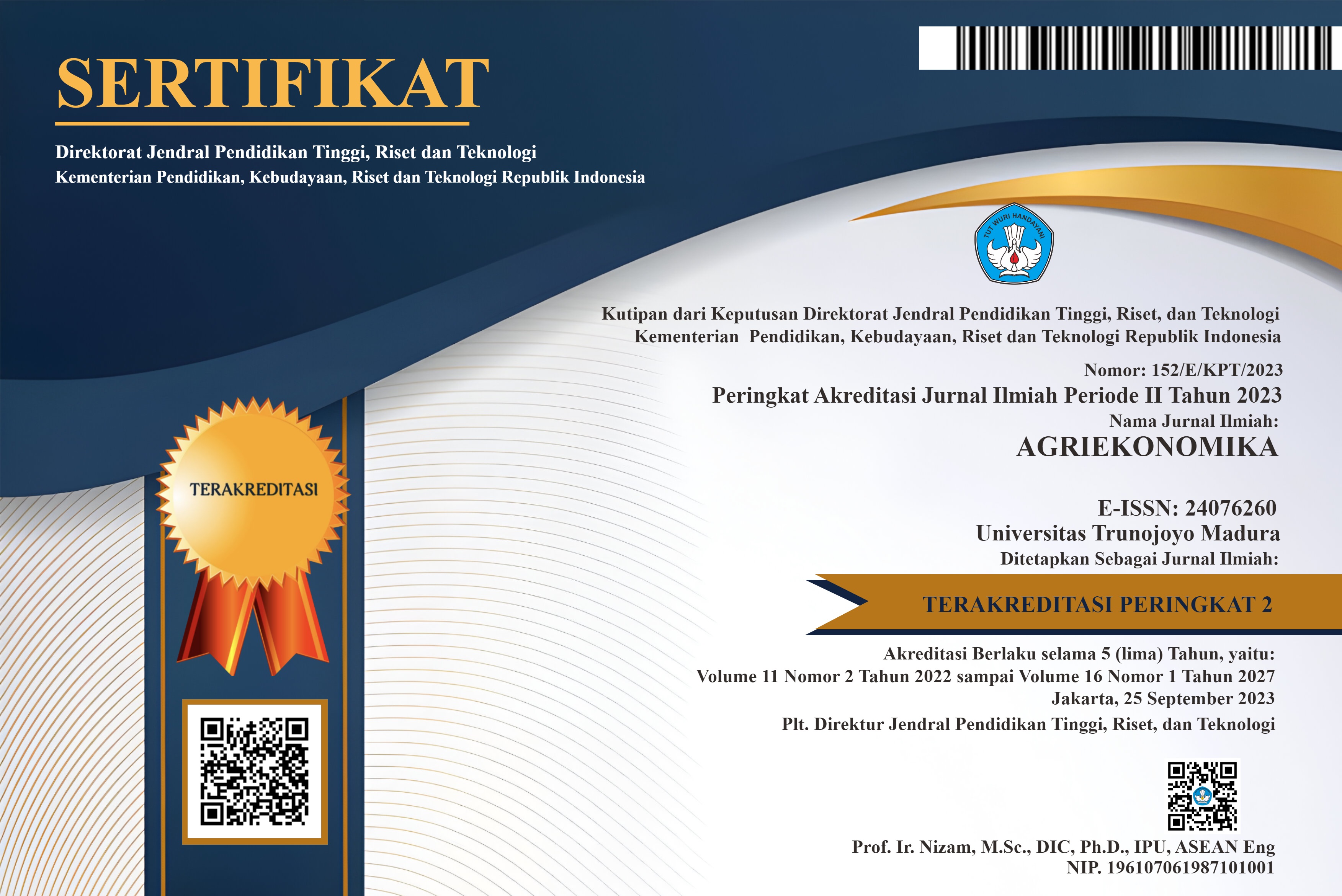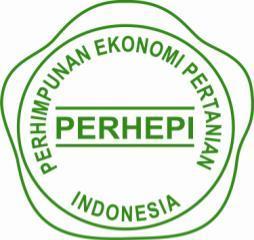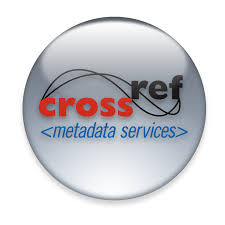Food Consumption Management in Urban Households in Indonesia
Abstract
The most significant contributor to the increase in food waste in Indonesia is household sectors, mainly urban areas. One approach to reducing food waste is Food Consumption Management (FCM). However, the application of FCM at the household level is strongly influenced by various aspects. This study aims to determine the relationship between socio-economic aspects and food consumption management at the urban household level conducted in four major cities in Indonesia during the Covid-19 pandemic. Primary data was collected using a digital questionnaire distributed to households in Medan, Yogyakarta, Surabaya, and Denpasar. A total of 149 household respondents were obtained and analyzed descriptively. Meanwhile, the relationship between socio-economic aspects and the management of food consumption was analyzed using the Pearson correlation method. The results of this study reveal that household income and the number of family members are significant factors closely related to household food consumption management (FCM), especially in terms of providing, storing, and disposing of food waste.
Keywords
Full Text:
PDFReferences
Aydin, A. E., & Yildirim, P. (2021). Understanding food waste behavior: The role of morals, habits, and knowledge. Journal of Cleaner Production, 280, 124250. https://doi.org/10.1016/j.jclepro.2020.124250
Barone, A. M., Grappi, S., & Romani, S. (2019). "The road to food waste is paved with good intentions": When consumers' goals inhibit the minimization of household food waste. Resources, Conservation and Recycling, 149(October 2018), 97–105. https://doi.org/10.1016/j.resconrec.2019.05.037
Bender, K. E., Badiger, A., Roe, B. E., Shu, Y., & Qi, D. (2021). Consumer behavior during the COVID-19 pandemic: An analysis of food purchasing and management behaviors in U.S. households through the lens of food system resilience. Socio-Economic Planning Sciences, 82(A), 101107. https://doi.org/10.1016/j.seps.2021.101107
Bogevska, Z., Berjan, S., Bilali, H. EL, Sadegh Allahyari, M., Radosavac, A., & Davitkovska, M. (2021). Exploring food shopping, consumption and waste habits in North Macedonia during the COVID-19 pandemic. Socio-Economic Planning Sciences, August, 101150. https://doi.org/10.1016/j.seps.2021.101150
BSR. (2014). Analysis of U.S. Food Waste Among Food Manufacturers, Retailers, and Wholesalers. The Food Waste Reduction Alliance, 1–24.
Denny Eka Setiawan. (2020). Menuju Indonesia Bersih dan Bebas Sampah 2025. Mitra Bentala. https://mitrabentala.org/menuju-indonesia-bersih-dan-bebas-sampah-2025/
Evans, D. (2012). Beyond the Throwaway Society: Ordinary Domestic Practice and a Sociological Approach to Household Food Waste. Sociology, 46(1), 41–56. https://doi.org/10.1177/0038038511416150
Fami, H. S., Aramyan, L. H., Sijtsema, S. J., & Alambaigi, A. (2019). Determinants of household food waste behavior in Tehran city: A structural model. Resources, Conservation and Recycling, 143(December 2018), 154–166. https://doi.org/10.1016/j.resconrec.2018.12.033
FAO. (2013). Food wastage footprint. In Fao. www.fao.org/publications
FAO. (2016). Save Food : Global Initiative on Food Loss and Waste Reduction| Key facts on food loss and waste you should know ! Infographics. Food and Agriculture Organization of the United Nations, 01–02. http://www.fao.org/save-food/resources/keyfindings/en/
Fitriyani, I., Rachman, R., & Sumbawati, N. (2021). Menyikapi Perubahan Pola Konsumsi Masyarakat Pada Masa Pandemi Covid-19 Responding To Changing Patterns of Community Consumption During the Covid-19 Pandemic. Jurnal Pengabdian Kepada Masyarakat, 1(1), 20–24.
Grunert, K. G. (2005). Food quality and safety: Consumer perception and demand. European Review of Agricultural Economics, 32(3), 369–391. https://doi.org/10.1093/eurrag/jbi011
Hadiningrat, G. (2020). Women's Role in Food Waste Management in Indonesia (Study Case in Bandung). 31(Ismophs 2019), 31–35. https://doi.org/10.2991/ahsr.k.201203.006
Hidayat, S.I., Ardhany, Y.H. dan Nurhadi,E. 2020. Kajian Food Waste untuk mendukung Ketahanan Pangan. Agriekonomika Voulume 9 Nomor 2 171-182. https://doi.org/10.21107/agriekonomika.v9i2.8787
Humaniora. (2020). Wow, 1 Orang Indonesia Hasilkan Sampah Makanan 300 Kg Per Tahun. Media Indonesia. https://mediaindonesia.com/humaniora/282977/wow-1-orang-indonesia-hasilkan-sampah-makanan-300-kg-per-tahun
Karunasena, G. G., Ananda, J., & Pearson, D. (2021). Generational differences in food management skills and their impact on food waste in households. Resources, Conservation and Recycling, 175(September), 105890. https://doi.org/10.1016/j.resconrec.2021.105890
Lidwina, A. (2020). Perubahan Pola Konsumsi Masyarakat Selama Pandemi Covid-19. Databoks Data Stories, 2020. https://databoks.katadata.co.id/datapublish/2020/06/29/perubahan-pola-konsumsi-masyarakat-selama-pandemi-covid-19
Louise Petty. (2016). 17 Ways to Reduce Food Waste in Your Restaurant. High Speed Training. https://hub.highspeedtraining.co.uk/restaurant-food-waste/
Mattar, L., Abiad, M. G., Chalak, A., Diab, M., & Hassan, H. (2018). Attitudes and behaviors shaping household food waste generation: Lessons from Lebanon. Journal of Cleaner Production, 198, 1219–1223. https://doi.org/10.1016/j.jclepro.2018.07.085
Nafiroh, F., & Fuad, I. L. (2019). ESTIMASI FOOD WASTE BERAS RUMAH TANGGA DI PEMUKIMAN INDUSTRI ( Studi Kasus di Desa Banjarkemantren Kecamatan Buduran Kabupaten Sidoarjo ). Agromix, 10(1), 30–43. https://www.mendeley.com/catalogue/11f518ca-c28c-38d4-970c-1152c8baf013
Nguyen Khanh Linh. (2018). Food waste management in the hospitality industry Case study: Clarion Hotel Helsinki. Haaga-Helia University of Applied Sciences, 1–63. https://www.theseus.fi/bitstream/handle/10024/142528/NGUYEN_KHANH LINH.pdf?sequence=1&isAllowed=y
Parizeau, K., von Massow, M., & Martin, R. (2015). Household-level dynamics of food waste production and related beliefs, attitudes, and behaviours in Guelph, Ontario. Waste Management, 35, 207–217. https://doi.org/10.1016/j.wasman.2014.09.019
Quested, T. E., Parry, A. D., Easteal, S., & Swannell, R. (2011). Food and drink waste from households in the U.K. Nutrition Bulletin, 36(4), 460–467. https://doi.org/10.1111/j.1467-3010.2011.01924.x
Rusdiana, S. dan Maesya, A. 2017. Pertumbuhan Ekonomi dan Kebutuhan Pangan di Indonesia. Agroekonomika Volume 6 Nomor 1 12-25. DOI: http://dx.doi.org/10.21107/agriekonomika.v6i1.1795
Salman Zafar. (2021). Waste Management in the Food Processing Industry. BioEnergy Consult. https://www.bioenergyconsult.com/waste-management-in-food-processing-industry/
Sassi, K., Capone, R., Abid, G., Debs, P., El Bilali, H., Bouacha, O. D., Bottalico, F., Driouech, N., & Terras, D. S. (2016). Food Wastage By Tunisian Households. Agrofor, 1(1). https://doi.org/10.7251/agreng1601172s
Schanes, K., Dobernig, K., & Gözet, B. (2018). Food waste matters - A systematic review of household food waste practices and their policy implications. Journal of Cleaner Production, 182, 978–991. https://doi.org/10.1016/j.jclepro.2018.02.030
Sooklal, R., Buthelezi, D., Oelofse, S., Matinise, S., Mohapi, T., Mabatle, K., & Phakoe, K. (2021). Food Waste Prevention & Management: A guideline for South Africa. Department of Environment, Forestry and Fisheries The Council for Scientific and Industrial Research, 38.
Soorani, F., & Ahmadvand, M. (2019). Determinants of consumers' food management behavior: Applying and extending the theory of planned behavior. Waste Management, 98, 151–159. https://doi.org/10.1016/j.wasman.2019.08.025
Stenmarck, Å., Jensen, C., Quested, T., Moates, G., Cseh, B., Juul, S., Parry, A., Politano, A., Redlingshofer, B., Scherhaufer, S., Silvennoinen, K., Soethoudt, H., Zübert, C., & Östergren, K. (2016). Estimates of European food waste levels. In IVL Swedish Environmental Research Institute - EU FUSIONS (Issue April). https://doi.org/10.13140/RG.2.1.4658.4721
Sucheran, S., & Olanrewaju, O. A. (2021). Food waste management of restaurants in Kwazulu-Natal, South Africa. Proceedings of the International Conference on Industrial Engineering and Operations Management, 58–69.
Tsiros, M., & Heilman, C. M. (2005). The Effect of Expiration Dates on the Purchasing Behaviour for Grocery Store Perishable Categories. Journal of Marketing, 69(2), 114–129.
Van Geffen, L., Van Herpen, E., & Van Trijp, H. (2016). Causes & Determinants of Consumers Food Waste. Eurefresh.Org, 20, 26. https://eu-refresh.org/causes-determinants-consumers-food-waste
Vargas-Lopez, A., Cicatiello, C., Principato, L., & Secondi, L. (2021). Consumer expenditure, elasticity and value of food waste: A Quadratic Almost Ideal Demand System for evaluating changes in Mexico during COVID-19. Socio-Economic Planning Sciences, March, 101065. https://doi.org/10.1016/j.seps.2021.101065
Zainal, D., & Hassan, K. A. (2019). Factors Influencing Household Food Waste Behaviour in Malaysia International Journal of Research in Business, Economics and Management. International Journal of Research in Business, Economics and Management, 3(3), 56–71.
DOI: https://doi.org/10.21107/agriekonomika.v11i1.12502
Refbacks
- There are currently no refbacks.







